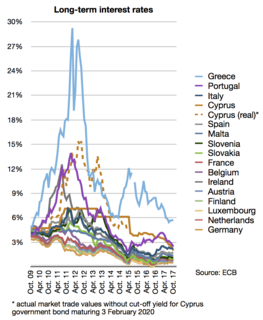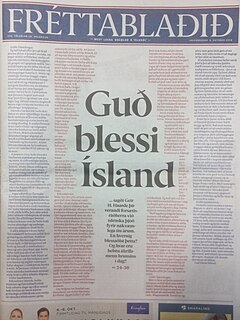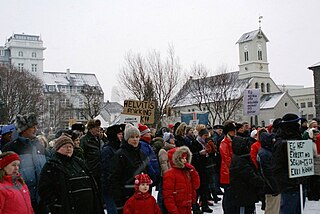 W
WThe European debt crisis, often also referred to as the eurozone crisis or the European sovereign debt crisis, is a multi-year debt crisis that has been taking place in the European Union (EU) since the end of 2009. Several eurozone member states were unable to repay or refinance their government debt or to bail out over-indebted banks under their national supervision without the assistance of third parties like other eurozone countries, the European Central Bank (ECB), or the International Monetary Fund (IMF).
 W
WEuropean debt crisis contagion refers to the possible spread of the ongoing European sovereign-debt crisis to other Eurozone countries. This could make it difficult or impossible for more countries to repay or re-finance their government debt without the assistance of third parties. By 2012 the debt crisis forced 5 out of 17 Eurozone countries to seek help from other nations. Some believed that negative effects could spread further possibly forcing one or more countries into default.
 W
WThe European debt crisis, often also referred to as the eurozone crisis or the European sovereign debt crisis, is a multi-year debt crisis that has been taking place in the European Union (EU) since the end of 2009. Several eurozone member states were unable to repay or refinance their government debt or to bail out over-indebted banks under their national supervision without the assistance of third parties like other eurozone countries, the European Central Bank (ECB), or the International Monetary Fund (IMF).
 W
WGuð blessi Ísland is the sentence with which the Icelandic Prime Minister Geir Haarde ended his television broadcast to the Icelandic nation on 6 October 2008, shortly after the beginning of the 2008–11 Icelandic financial crisis. The speech described the parlous state of the Icelandic banking sector and some of the government's efforts to improve the situation. Geir's closing words quickly became a symbol of the crash in Iceland.
 W
WHelvítis fokking fokk is an Icelandic neologism which became a widely used expression of discontent following the 2008 Icelandic financial crisis.
 W
WThe Icelandic financial crisis was a major economic and political event in Iceland that involved the default of all three of the country's major privately owned commercial banks in late 2008, following their difficulties in refinancing their short-term debt and a run on deposits in the Netherlands and the United Kingdom. Relative to the size of its economy, Iceland's systemic banking collapse was the largest experienced by any country in economic history. The crisis led to a severe economic slump in 2008–2010 and significant political unrest.
 W
WInDefence, also known as In Defence of Iceland, was a grassroots citizen movement formed in October 2008, in the first instance in protest at the Landsbanki Freezing Order 2008, passed at 10 am on 8 October 2008, during the 2008–2011 Icelandic financial crisis.
 W
WThe Icesave dispute was a diplomatic dispute between Iceland, the Netherlands and the United Kingdom that began after the privately owned Icelandic bank Landsbanki was placed in receivership on 7 October 2008. As Landsbanki was one of three systemically important financial institutions in Iceland to go bankrupt within a few days, the Icelandic Depositors' and Investors' Guarantee Fund (Tryggingarsjóður) had no remaining funds to make good on deposit guarantees to foreign Landsbanki depositors who held savings in the Icesave branch of the bank.
 W
WThe post-2008 Irish economic downturn in the Republic of Ireland, coincided with a series of banking scandals, followed the 1990s and 2000s Celtic Tiger period of rapid real economic growth fuelled by foreign direct investment, a subsequent property bubble which rendered the real economy uncompetitive, and an expansion in bank lending in the early 2000s. An initial slowdown in economic growth amid the international financial crisis of 2007–2008 greatly intensified in late 2008 and the country fell into recession for the first time since the 1980s. Emigration, as did unemployment, escalated to levels not seen since that decade.
 W
WThe post-2008 Irish banking crisis was the situation whereby, due to the Great Recession, a number of Irish financial institutions faced almost imminent collapse due to insolvency. In response, the Irish government instigated a €64 billion bank bailout. This then led to a number of unexpected revelations about the business affairs of some banks and business people. Ultimately, added onto the deepening recession in the country, the banks bailout was the primary reason for the Irish government requiring IMF assistance and a total restructuring of the Irish Government occurred as result of this.
 W
WThe Landsbanki Freezing Order 2008 is an Order of HM Treasury to freeze the assets of Icelandic bank Landsbanki in the United Kingdom made under the Anti-terrorism, Crime and Security Act 2001, by virtue of the fact that the Treasury reasonably believed that "action to the detriment of the United Kingdom's economy has been or is likely to be taken by a person or persons." As required by the enabling Act, the Order was approved by both Houses of Parliament on 28 October 2008, which was 20 days after the Order had come into force.
 W
WLS6 is the first novel by Mario Crespo, published in 2011 by Bohodón Ediciones. The novel was chosen as a Spanish representative at the Festival du Premier roman at Chambéry in 2012.
 W
WThe 2008–2014 Spanish financial crisis, also known as the Great Recession in Spain or the Great Spanish Depression, began in 2008 during the world financial crisis of 2007–08. In 2012, it made Spain a late participant in the European sovereign debt crisis when the country was unable to bail out its financial sector and had to apply for a €100 billion rescue package provided by the European Stability Mechanism (ESM).
 W
WThe 2008–2014 Spanish financial crisis, also known as the Great Recession in Spain or the Great Spanish Depression, began in 2008 during the world financial crisis of 2007–08. In 2012, it made Spain a late participant in the European sovereign debt crisis when the country was unable to bail out its financial sector and had to apply for a €100 billion rescue package provided by the European Stability Mechanism (ESM).
 W
WAntecedents and Causes of the Collapse of the Icelandic Banks in 2008 and Related Events, better known as The Report of the Investigation Commission of Althing, and earlier referred to as a 'White Book', is a report covering the background and the crash of the Icelandic banking system in 2008.
 W
WUkraine was hit heavily by the late-2000s recession, the World Bank expects Ukraine's economy to shrink 15% in 2009 with inflation being 16.4%.